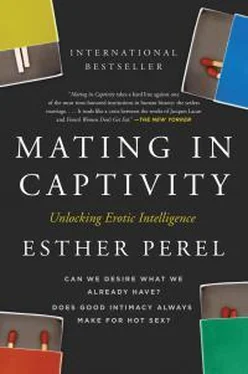Sometimes the emotional weaving is done through talk; often, it is not. Building a bookshelf for your lover, changing the snow tires on your wife’s car, and learning to make his mom’s chicken soup all carry the promise of connection. Golde in Fiddler on the Roof reminds us that even ordinary daily activities will, over time, weave themselves into a rich tapestry of connection. Eddie and Noriko, masters of nonverbal communication, can teach us all a lesson in alternative ways to express our love. When we value only what is disclosed through words, we do ourselves a disservice. At a time when we could use just about any way to connect, we need to honor and recognize the many ways we can reach out and touch someone.
4
Democracy Versus Hot Sex
Desire and Egalitarianism Don’t Play by the Same Rules
No bill of sexual rights can hold its own against the lawless, untamable landscape of the erotic imagination.
—Daphne Merkin
SEVERAL YEARS AGO I ATTENDEDa presentation at a national conference where the speaker discussed a couple who had come to therapy in part because of a sharp decline in their sexual activity. Previously, they had acted out fantasies of domination and submission; now, following the birth of their second child, the wife wanted more conventional sex. But the husband was attached to their old style of lovemaking, so they were stuck. The presenter took the approach that resolving this couple’s sexual difficulty was going to require working through the emotional dynamics of their marriage and their new status as parents. But in the discussion that followed, the audience proved far less interested in the couple’s overall relationship than in the disconcerting presence of domination and submission in their erotic life.
What pathology, several participants asked, might underlie the man’s need to sexually objectify his wife, and her desire for bondage in the first place? Perhaps, some people speculated, motherhood had restored her sense of dignity, so that now she refused to be so demeaned. Some suggested that the impasse reflected long-standing gender differences: men tend to pursue separateness, power, and control, while women yearn for loving affiliation and connection. Still others were certain that couples like this needed more empathetic connection to counteract their tendency to engage in an implicitly abusive, power-driven relationship. What these remarks made clear was the unspoken subtext that such practices are inherently degrading to women, a rebuke to the very idea of gender equality, and antithetical to a good, healthy marriage.
After two hours of talking about sex, the group had not once mentioned pleasure or eroticism, so I finally spoke up. I wondered, I said, if I was the only one surprised by this omission. After all, the sex had been entirely consensual. Maybe the woman no longer wanted to be tied up by her husband because now she had a baby continually attached to her breasts, binding her more effectively than ropes ever could. Didn’t people in the audience have their own sexual preferences, preferences they didn’t feel the need to interpret or justify? Why automatically assume that there had to be something degrading and pathological about this couple’s erotic play? More to the point, I wondered, was a woman’s ready participation in submission too great a challenge for the politically correct? Was it too threatening to conceive of a strong, secure woman enjoying acting out sexual fantasies of submission? Would such recognition lessen women’s moral authority? Perhaps the participants in this conference were afraid that if women did reveal such desires, they’d somehow sanction male dominance everywhere—in business, professional life, politics, and economics. Maybe the very ideas of sexual dominance and submission, conquest and subjugation, aggression and surrender (regardless of which partner plays which part) can’t be squared with the ideals of fairness, compromise, and equality that undergird marriage today.
As a relative outsider with regard to American society, I suspected that the attitudes I saw in this meeting reflected deeper cultural assumptions. Did the clinicians in the room believe that this couple’s sexual practices, even though consensual and completely nonviolent, were too wild and “kinky,” and therefore inappropriate and irresponsible for the ponderously serious business of maintaining a marriage and raising a family? It was as if sexual pleasure and eroticism that strayed onto slightly outré paths of fantasy and play, particularly games involving aggression and power, must be stricken from the repertoire of responsible adults in loving, committed relationships.
After the conference, I engaged in many intense conversations with couples therapists from South America, the Middle East, and Europe. We realized that we all felt somewhat out of step with American sexual attitudes, but putting a finger on what was culturally different wasn’t easy. On a subject as laden with taboos as the expression of sexuality, making generalizations is a slippery slope. But if I could hazard one unpolished observation, I would say that egalitarianism, directness, and pragmatism are entrenched in American culture and inevitably influence the way we think about and experience love and sex. Latin Americans’ and Europeans’ attitudes toward love, on the other hand, tend to reflect other cultural values, and are more likely to embody the dynamics of seduction, the focus on sensuality, and the idea of complementarity (i.e., being different but equal) rather than absolute sameness.
Bedroom Politics
Some of America’s best features—the belief in democracy, equality, consensus-building, compromise, fairness, and mutual tolerance—can, when carried too punctiliously into the bedroom, result in very boring sex. Sexual desire and good citizenship don’t play by the same rules. And while enlightened egalitarianism represents one of the greatest advances of modern society, it can exact a toll in the erotic realm.
Elizabeth spent twenty years shepherding Vito from the machismo traditions of southern Italy to the postfeminist equality of suburban New York. When he says, “I think we’re partnering better,” in a voice that still sounds like Don Vito Corleone’s, I know just how much cultural transformation has taken place. Elizabeth is a woman in her mid-forties who describes herself as “hyperresponsible.” She’s a school psychologist who oversees the well-being of more than 400 elementary school children in addition to being in charge of most things in her own home. “I’ve always done the right thing. I’ve always been very task-oriented. I’ll make a list and keep it. In some ways it’s always worked. And I’ve always been in relationships where being the coordinator, competent and in control, was my designated job. There didn’t seem to be any time when I could just let myself go, feel free and giddy and maybe even a little irresponsible” Elizabeth pauses and smiles shyly. “Then I met Vito and discovered just how much I’m drawn to sexual submission. It may not fit the way I always thought of myself, or the way others thought of me, but it’s the truth.”
“Because sex is a place where you can safely lose control?” I ask.
“Yes.”
“It is the one area where you don’t have to make any decisions, where you don’t have to feel responsible for anyone else.”
“For me it’s like a vacation,” she explains. “I don’t have to wear makeup; I don’t have to answer the phone; I don’t have to be in charge. It’s like being on a wonderful, distant island, far away from my ordinary life. I can just step out of my world and be somebody else, sexy and a little wild.” Elizabeth wants to be manhandled, told what to do—as if, through her erotic self, she can correct an imbalance in her life and replenish something vital. She delights in the abandon that comes with the sense of powerlessness. And I would add that she also gets a charge from playing in the forbidden zone of inequality.
Читать дальше










